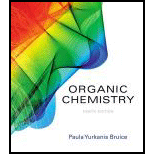
(a)
Interpretation:
Product of the given reaction has to be given.
Concept Introduction:
Reactions of conjugated diene:
Diene with conjugated double bond reacts with a limited quantity of electrophilic reagent resulting addition at only one of the double bonds, two addition product are formed. Oneis 1,1-adition product another one is 1,4-adition product. 1,2-addition called direct addition and 1,4-adition called conjugated addition.
(b)
Interpretation:
Product of the given reaction has to be given.
Concept Introduction:
Reactions of conjugated diene:
Diene with conjugated double bond reacts with a limited quantity of electrophilic reagent resulting addition at only one of the double bonds, two addition product are formed. Oneis 1,1-adition product another one is 1,4-adition product. 1,2-addition called direct addition and 1,4-adition called conjugated addition.
Want to see the full answer?
Check out a sample textbook solution
Chapter 8 Solutions
Organic Chemistry (8th Edition)
- What is the major product from the following reactions?arrow_forwardIdentify the product in each reaction, and explain why starting materials with identical functional groups give different products.arrow_forwardDescribe the stereochemistry of the bromohydrin formed in each reaction (each reaction is stereospecific). (a) cis-3-Hexene + Br2/H2O (b) trans-3-Hexene + Br2/H2Oarrow_forward
- What is the major product from the following reaction?arrow_forwardProvide the major product for the reaction of the following starting material with excess HBr. If more than one product is formed, list the major product first. If no reaction, draw the starting material.arrow_forwarda. Draw the major product(s) of the reaction of 1-methylcyclohexene with the following reagents, disregarding stereoisomers: 1. NBS/Δ/peroxide 2. Br2/CH2Cl2 3. HBr 4. HBr/peroxide b. For each reaction, show which stereoisomers are obtained.arrow_forward
- The following problems will require more than one step of reagents to arrive at the final product. Write the complete set of reagents and intermediate product for each step. Each of these can be accomplished in five steps.arrow_forwardDraw the products obtained in each of the following reactions, assuming that only one equivalent of each reagent is used in each case:arrow_forwardIndicate the product of each reaction belowarrow_forward
 Organic ChemistryChemistryISBN:9781305580350Author:William H. Brown, Brent L. Iverson, Eric Anslyn, Christopher S. FootePublisher:Cengage Learning
Organic ChemistryChemistryISBN:9781305580350Author:William H. Brown, Brent L. Iverson, Eric Anslyn, Christopher S. FootePublisher:Cengage Learning
